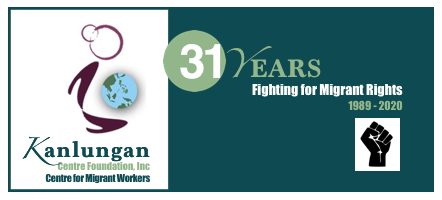Kanlungan statement on
the covid 19
Kanlunugan Centre Foundation Inc. is one with all migrant
workers and their families in this national, and global medical emergency.
Migrant workers are risking their personal safety to feed their families, and
in the process, producing remittances that help keep the Philippine economy
afloat.
We are also expressing our gratitude to our health workers, our
front liners who are braving all personal risks, to help provide the necessary
services to those already affected by the corona virus disease (COVID-19).
The enhanced community quarantine, essentially a national
lockdown, will further result in more economic displacements for daily wage
earners, informal workers, and the urban poor, who have no safety nets. While
the necessity of the quarantine is acknowledged, which came a little bit late
actually, the reality is that millions of Filipinos have to earn their
livelihood, on a daily basis. Isang-kahig, isang-tuka, so goes a local song.
It is therefore incumbent that the government release all
available means of funds, to help cushion the economic impact of the quarantine
to the daily survival of the more at risks citizens. The 2020 national budget
contains pork barrel, which the lawmakers are “earmarking” for their special
projects. Instead of thinking for the next general election in 2022,
legislators and the executive branch should release this fund to help with the
current emergency. The several billion pesos worth of intelligence fund could
also be utilized to help in this emergency.
Many migrant workers are now sending emergency remittances to
their respective families here in the Philippines, to allow them to buy basic
necessities. This can be observed by recent long lines in money transfers
business branches. These remittances will have the expected multiplier effect,
a portion of it will provide for the immediate families, while some portion can
be loaned out to others who are in great need, for their respective families.
And yet, these OFWs themselves are facing uncertainty and displacement in their
host countries, as the economic fallout is being felt anywhere in the world,
except perhaps in very few countries.
Hence, we are calling the government to urgently act and provide
immediate relief and assistance to our migrant workers:
1. All migrant workers regardless of status should be provided
with medical and health care. As stated under the migrant workers act Section
19, the state is mandated to provide A) Counseling and legal services, and B),
Welfare assistance including procurement of medical and hospitalization
services.
2. Ensure that labour rights are protected and wages are not
withheld by their employers, and their travel documents and passport should be
in their possession.
3. If the migrant workers wish to be repatriated, all necessary
assistance should be extended by the government.
4.Welfare services should be available at all times. Consular
offices, missions, embassies should device mechanisms to ensure that assistance
is available and accessible. A 24/7 hotline should be available to OFWs.
5.This is also a call to the entire migrant community, to work
together in this extraordinary time, ensure that the rights of everybody is
protected. Let us help in popularizing the culture of migrant workers-helping-other
migrant workers, regardless of status, race, religion, and political beliefs.
The culture of mutual cooperation, solidarity, caring for the needy and other
humanitarian acts will surely help us all in this global emergency.
6. We are also calling upon the national government to provide
all necessary services to all returning migrants regardless of status, land
based or sea based. Governments should provide the necessary welfare, health,
psycho-social intervention and legal services, including repatriation and
reintegration of all migrants.
We cannot underscore enough that migrant rights are human
rights, and these principles do not take a backseat even during emergencies,
but should be respected even more.



